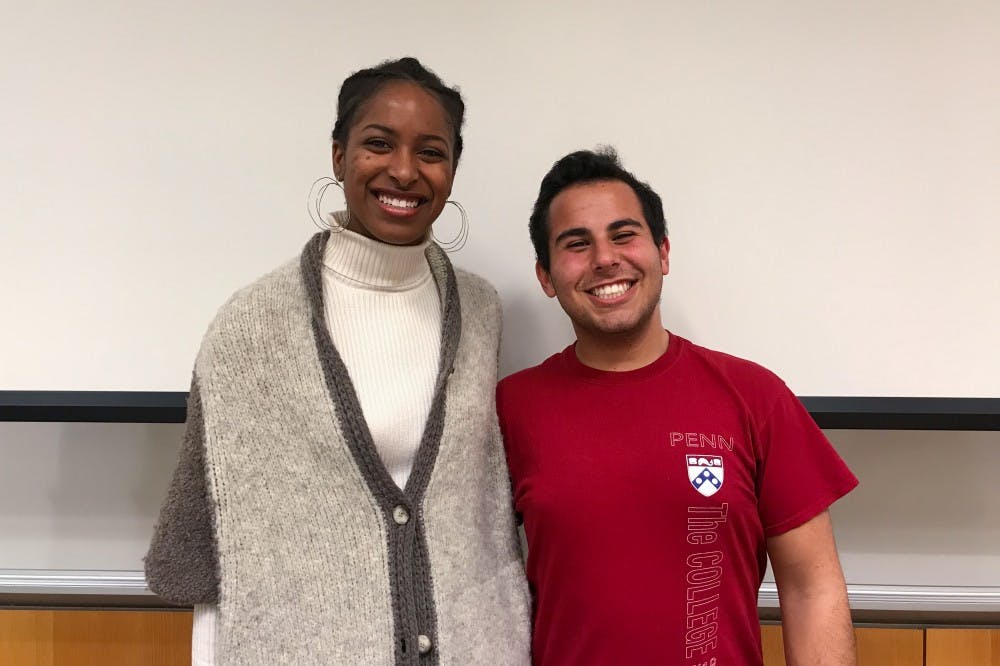
Jordan Andrews and Michael Krone
Credit: Claire SlineyThe newly-elected Undergraduate Assembly President Michael Krone and Vice President Jordan Andrews will be prioritizing their goals of connecting Penn with the surrounding Philadelphia community, continuing mental wellness initiatives, and improving communication between the administration, the UA, and Penn students.
Krone and Andrews said their platform diverges from that of the previous leadership primarily through its focus on community engagement.
“We just haven't noticed a lot of inspiration of other UA members to care a lot about [community engagement] in the recent past because other issues have taken the lead,” Krone said.
Krone and Andrews said they aim to distribute “SEPTA Welcome Kits” containing maps of public transit routes around the city and a preloaded SEPTA key to every student who moves on campus at the beginning of the school year.
Andrews said that initiatives that integrate Penn with the rest of the Philadelphia community can also double as mental health-related projects.
“In general it seems like removing yourself from the campus environment and getting out, feeling more comfortable in the city that you're in and not just the 10 block radius is one way to feel safer, better, healthier,” Andrews said. “It just gives students a different outlet.”
Mental wellness has been a major priority for the UA this past year. To reduce unnecessary club competition, the UA issued a set of rules Student Activities Council-funded clubs must follow. In addition, former UA President Michelle Xu and former UA Vice President Jay Shah sent out a Mental Health Survey to all Penn students on Feb. 27.
Krone and Andrews said that they intend to also maintain mental health as a primary focus of their UA leadership, in part by using the results from the survey.
According to the UA meeting minutes from April 1, in the mental health survey, over 80 percent of students said that they thought Penn's Counseling and Psychological Services is “far." In addition, an “overwhelming majority of students” are aware of peer support groups such as Penn Benjamins and RAP-Line, but 90 percent of respondents had never used these resources.
“I think what we have now is an information overload problem,” Krone said.
They said that they want to implement “the embedded model” in which CAPS would establish satellite locations around campus as a way to make its resources more accessible to students.
Xu said that she thought the embedded model might not work because students might be less comfortable seeking out mental health resources without that additional degree of anonymity granted by going to the central CAPS office, which is several blocks north of campus.
“I think there's no reason why we can't have both,” Andrews said. “We’ll be able to meet the needs of the majority of students because you'll have the students who want to be anonymous, you'll have the students that don't mind.”
Krone and Andrews also said that they want to improve how students are informed about what goes on within the UA. Andrews said she hopes to use digital content and social media platforms to implement a new video outreach series.
The emphasis on communication and transparency comes from the fact that both Krone and Andrews served as Communications Director, Andrews this past year and Krone the year before.
Ensuring that all Penn students have equal access to opportunities for success will also be a top priority on Krone and Andrews’s agenda next year. One of their focuses is to spread the availability of "test banks."
“You don't have to know someone or have a sibling that went here or join a certain group in order to have access to academic archives because they're not banned by University policy,” Andrews said.
College sophomore and former UA College Representative Ariela Stein said that she hopes that Krone and Andrews will maintain the same tight-knit community within the UA that Xu and Shah worked hard to establish.
Shah added that bridging that gap between organizations on campus, while "intangible," was an important undertaking this past year that he hopes will be continued throughout Krone and Andrews' term.
Krone said that with the end of the semester quickly approaching, the bulk of his and Andrews’ work will take place next school year.
However, he added that they intend to get a “jumpstart” and will still begin reaching out to UA members, student groups, and members of the Penn community to see what projects they hope to collaborate on in the fall.
Krone and Andrews were officially initiated into their roles on April 15 at the assembly’s internal transition meeting.
The Daily Pennsylvanian is an independent, student-run newspaper. Please consider making a donation to support the coverage that shapes the University. Your generosity ensures a future of strong journalism at Penn.
Donate



